US Senator proposes tariffs to curb Iran's oil revenues
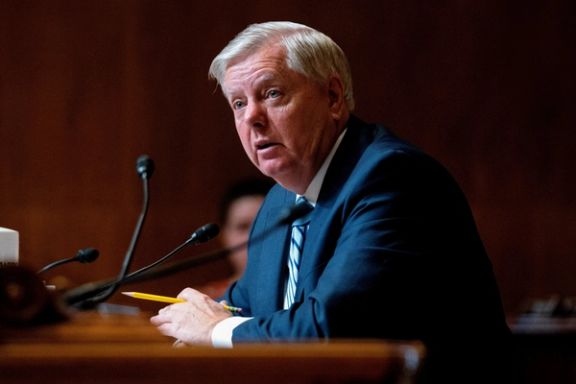
US Senator Lindsey Graham (R-SC) has proposed new legislation to impose tariffs on nations buying crude oil or petroleum products from Iran.

US Senator Lindsey Graham (R-SC) has proposed new legislation to impose tariffs on nations buying crude oil or petroleum products from Iran.
Graham announced on X that his proposed Tariffs for Terrorism Act results from extensive consultations with former President Donald Trump, focusing on strategies to curtail Iran's ongoing oil revenue.
“It is long past time to make those that enrich this terrorist regime pay a price, and there’s no better price than tariffs on products coming into the United States,” Graham wrote on X.
In an interview with Jewish Insider, Graham emphasized that Trump would re-impose maximum pressure on Iran from day one, "starting with tariffs on countries supporting terrorism and the Ayatollah."
A consistent stance of the Trump administration has been that the revenue generated from Iran’s oil sales significantly finances terrorism and the nation's advancing nuclear program.
In his bill, Graham also referenced the International Atomic Energy Agency (IAEA), which has become increasingly critical of Iran’s nuclear activities. The IAEA has expressed grave concerns about the ostensibly peaceful nature of the program. According to the agency’s reports, Iran has amassed substantial quantities of highly enriched uranium, implying a potential weapons development agenda.
Recently, Secretary of State Tony Blinken revealed that Iran's nuclear breakout time has been reduced to approximately one to two weeks, underscoring the critical urgency of addressing this matter.
In June, Graham criticized the Biden administration and highlighted that Iran has significantly benefited from oil sales in recent years. He condemned the implementation of sanctions, asserting that “Iran is either evading sanctions or the Biden Administration is not enforcing them.”
Graham noted that countries like China are acquiring Iranian oil at below-market prices and financing Tehran. He said, “Sanctions are crucial but frequently circumvented. Thus, we propose tariffs on any nation purchasing oil from Iran, as their discounted oil acquisitions provide them with an economic advantage over us. No one understands tariffs better than President Trump.”
Iran has been boasting about selling crude oil to 17 countries, including some in Europe, despite global sanctions. According to the Foundation for Defense of Democracies (FDD), Iran exported 141.7 million barrels of oil during the first quarter of 2024, marking a 28 percent increase compared to the same period last year.
This surge in oil exports has significantly bolstered Tehran's currency reserves, enabling support for its military industry and proxies as it intensifies tensions with Israel.
In March, Iranian exports peaked at 1.82 million barrels per day, the highest rate since October 2018, just before the Trump administration reinstated oil sanctions. This growth in exports has had a substantial impact on Tehran's budget, as oil exports accounted for over 40 percent of Iran's total export revenue in 2023.
The Biden administration has faced ongoing criticism for its perceived leniency toward Iran, particularly in its reluctance to confront Iran’s actions and avoid escalating tensions ahead of the November election.
This soft approach in enforcing sanctions has also allowed Iran's nuclear program to exceed international regulations, with the UN's nuclear chief recently warning Iran is "weeks not months" away from a nuclear weapon.
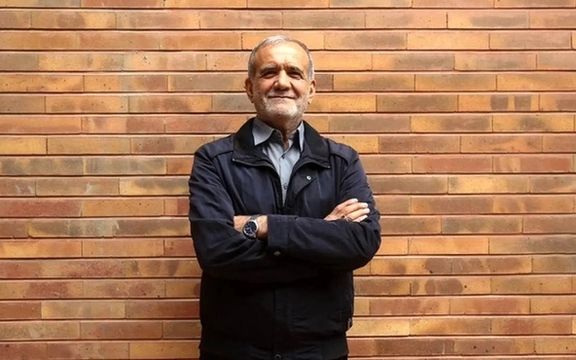
Newly-elected President Masoud Pezeshkian, who is frequently seen in public wearing casual zip-up jackets, is facing growing criticism for not “dressing up for the job.”
Prominent theater and cinema actor Reza Kianian was among the most vocal to chime in critically on Pezeshkian's dress code.
“I’d like to request you to wear a light summer suit jacket instead of that casual jacket,” Kianian said in an Instagram post addressed to the President on Sunday.
Since then, domestic Iranian news websites and social media users have extensively shared and republished the post.
Referring to former populist President Mahmoud Ahmadinejad, Kianian remarked that Iranians do not have “good memories” of the casual zip-up jacket (Kapshan in Persian) often associated with Ahmadinejad.
The jacket, which was a way to visually symbolize his anti-Western and anti-Israeli stance, remains a lasting image in many Iranians' minds.
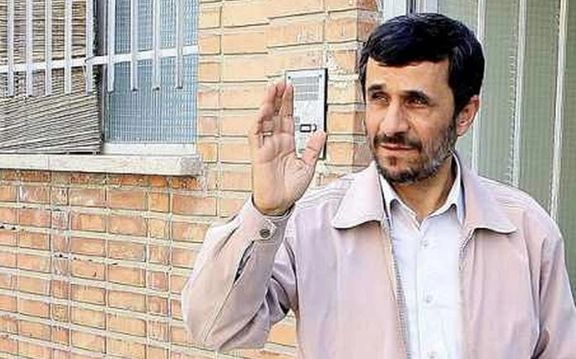
“You must visit New York in a few months [to attend the UN General Assembly meeting]. What you wear is very important,” Kianian told Pezeshkian in his post, offered advice on clothing, socks, and shoes, and even recommended “a proper haircut”. “Let Iran be pictured befittingly [by foreign media at the event].”
Among the over 5,000 Instagram users who commented on Kianian’s post, many dismissively stated that Pezeshkian's style was inconsequential, arguing that more pressing issues deserved his attention.
Others agreed with Kianian, asserting that the new president should adhere to international dress protocols, at least while representing the country on the global stage.
Some of Pezeshkian's supporters on social media have argued that focusing on his attire at the UNGA meeting is irrelevant. They point out that Arab leaders, as well as Indians, Malaysians, and others, often wear traditional robes and flip-flops at such events. They contend that what truly matters is what Pezeshkian has to offer the world.
Pezeshkian, a heart surgeon and lawmaker who was relatively unknown to many Iranians before the snap elections following former President Ebrahim Raisi's death in a helicopter crash in May, has occasionally mentioned that he finds it challenging to adhere to the strict protocols required of the president. He has also expressed that he would like to continue living like an "ordinary Iranian" and to be true to himself.
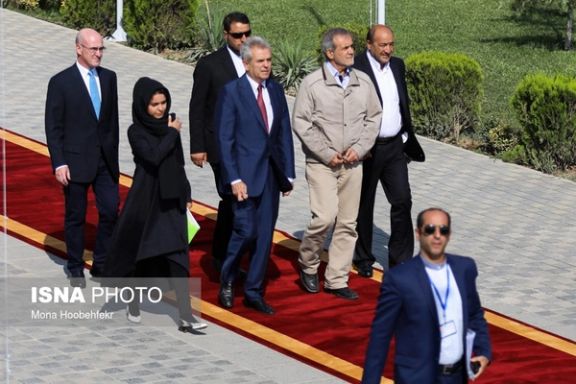
Social media posts and media articles dating back to August 2016, when Pezeshkian was the Deputy Speaker of Parliament, criticized his disregard for diplomatic dress codes and norms during the inauguration ceremony of President Hassan Rouhani, particularly in how he welcomed foreign delegations.
“Not observing official protocols, sneaking into Parliament unannounced [on Saturday], shopping at your local grocery store, and wearing a jacket in the middle of the summer is not a sign of being a man of the people and a revolutionary. It is a sign that you are another version of Ahmadinejad,” another critic posted on X.
Ahmadinejad, whose supporters took his badly worn zip-up jackets and windbreakers as a sign that he was “a man of the people,” began wearing formal suits regularly after a few years.
In recent years, the former President has undergone several superficial changes alongside his supposed shifts in worldview. Ahmadinejad has reportedly undergone cosmetic procedures to reduce the deep wrinkles around his eyes and mouth, aiming to project a new image that appeals to fashion-conscious middle-class Iranians.
Following the Islamic Revolution of 1979, wearing ties became a symbol of Western cultural adherence, which young revolutionaries like Pezeshkian strongly denounced as 'un-Islamic.' Consequently, an unofficial ban was imposed on selling and wearing ties.
Subsequently, wearing a tie became a subliminal statement of opposition to the clerical regime among professional Iranians, including doctors, lawyers, and wealthy businessmen.
The male revolutionaries also disapproved of wearing collared shirts. In response, the Iranian foreign ministry designed collarless shirts for its diplomats, resembling the garments clerics wear under their robes.
Some diplomats, such as former Foreign Minister Javad Zarif, style these mandatory collarless shirts with expensive cufflinks.
Fashion awareness appears to be important among clerics, too.
The former "reformist" President Mohammad Khatami, frequently dubbed “the man in the chocolate-brown robe” by Iranian media for one of his robes, was often praised for his “impeccable style.” The "moderate" former President Hassan Rouhani was known for wearing robes reportedly made from expensive Italian fabrics.
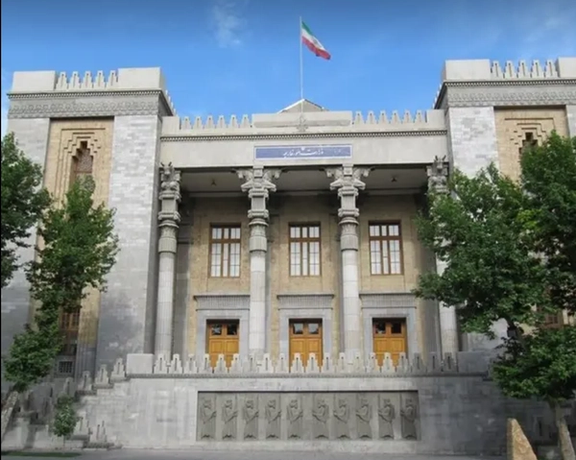
Iran's foreign ministry summoned the British ambassador to Tehran on Wednesday to protest the UK government's extradition to the US of an Iranian national accused of bypassing the American sanctions on Tehran.
Saeid Haji Agha Mousaei, 53, appeared in Chicago federal court on Monday after being extradited from the UK. He faces charges related to a long-term conspiracy to bypass US export restrictions and redirect advanced American electronic testing technology to Iran through third-party countries.
In a statement on Wednesday, Iran's Foreign Ministry said the British ambassador to Tehran, Simon Shercliff, was summoned to receive Iran's "strong protest against the unlawful arrest of the Iranian national and his extradition to the US."
The US Justice Department says Mousaei was a manager of Dubai-based defendant company Millennium Product Company LLC (MPC). "As alleged, from in or about January 2014 through at least August 2018, Mousaei, MPC and others, devised and participated in a scheme to obtain controlled electronics with military applications, including signals equipment like oscilloscopes and spectrum analyzers, for export and re-export to Iran."
Mousaei, who was arrested in the United Kingdom on Jan. 24, 2023, pursuant to an Interpol diffusion notice, faces a maximum penalty of 20 years in prison, according to the US Justice Department.
Iran's Foreign Ministry said on Wednesday that "efforts are underway" to secure his release but did not provide any further details as to how exactly it plans to have him released from the US custody.
The Islamic Republic has a history of detaining European and American nationals visiting Iran and using them for securing the release of Iranian prisoners or assets frozen abroad, so much so that it has turned into a strategic tool in its foreign policy.
This controversial approach has been utilized by Tehran for decades, resulting in numerous high-profile cases that have captured global attention. A recent example involves the release of five American nationals in exchange for the transfer of $6 billion in Iranian funds frozen in South Korean banks because of the US sanctions.
Iran's use of "hostages" as a bargaining chip is not limited to the United States. In 2022, a historical military debt of £400 million was transferred from Britain to Tehran in exchange for two British-Iranian prisoners.
Last month, in one of the most controversial cases, Sweden extradited Hamid Nouri, a former Iranian jailor convicted of committing crimes against humanity, in exchange for Tehran's release of two Swedish nationals.
Western governments have repeatedly advised their citizens against visiting Iran, warning about the risk of kidnapping and arbitrary arrest for future use as hostages.
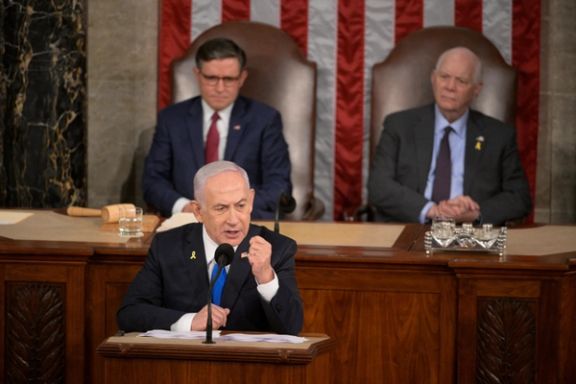
Israeli Prime Minister Benjamin Netanyahu tried to garner support for his country in Washington DC, proposing an anti-Iran alliance in the Middle East led by the US and Israel.
“All countries that are at peace with Israel and all those countries who will make peace with Israel should be invited to join this alliance,” Netanyahu said in a joint meeting of US Congress Wednesday afternoon. “We saw a glimpse of that potential alliance on April 14th. Led by the United States, more than half a dozen nations worked alongside Israel to help neutralize hundreds of missiles and drones launched by Iran against us.”
This was Netanyahu’s first address after the Hamas attack on October 7 and Israel’s retaliatory onslaught on Gaza, which has brought Tehran and Tel Aviv ever closer to an all-out war, with both countries targeting the other’s territory for the first time ever.
“For Iran, Israel is first, America is next,” Netanyahu said, “so when Israel fights Hamas, we're fighting Iran. When we fight Hezbollah, we're fighting Iran. When we fight the Houthis, we're fighting Iran. And when we fight Iran, we're fighting the most radical and murderous enemy of the United States of America.”
Netanyahu’s address was met by immediate reaction from Palestinian groups and Iran’s Supreme Leader Ali Khamenei, whose official X account posted in Hebrew as the Israeli prime minister delivered his speech to the US Congress, taunting both countries for ‘failing’ to defeat Hamas.
“The Resistance’s strength is more and more evident by the day,” the post on X read. “A huge system like the US, in all military, political and economic dimensions, stands behind the Zionists in the fight against Hamas, but they’ve been unable to bring it to its knees.”
In his hour-long address, Netanyahu seemed to be attempting to convince the US lawmakers and an increasingly doubtful American public that the conflicts in the Middle East, and the war on Gaza, in particular, were a war of good against evil, and that Israel was the only thing standing in the way of Iran “conquering” the region.
Many of those present in the Congress cheered Netanyahu, showing their support with standing ovations, as has become customary in these addresses. More notable than the support, however, was the absence of dozens of Democrats, including Vice President Kamala Harris, who leads the race to become her party’s nominee for 2024 presidential election in November.
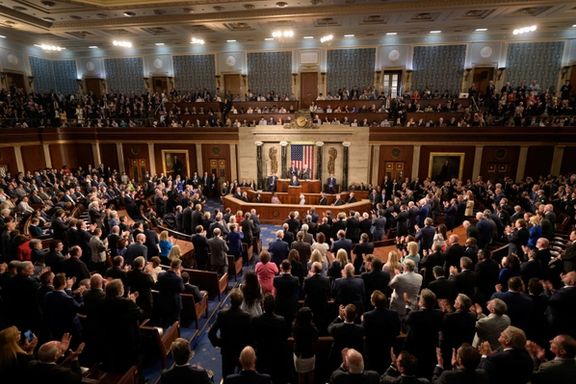
Netanyahu’s address to the US Congress this year was more contentious than ever, due to the ongoing war on Gaza, which has killed almost 40,000 civilians, according to the health ministry in Gaza. Thousands gathered near the Capitol building in Washington DC in protest against Israel’s prime minister.
The protests were not left unnoticed by Netanyahu. Quoting the US director of national intelligence, he said the anti-Israel protests in the US are funded by Iran. “I have a message for these protesters,” he said, “when the tyrants of Tehran who hang gays from cranes and murder women for not covering their hair are praising and promoting and funding you, you have officially become Iran's useful idiots.”
Earlier this month, Director of National Intelligence Avril Haines issued a warning that actors tied to Iran's government had posed as activists online, encouraged protests regarding the Israel-Hamas war in Gaza, and even provided demonstrators with financial support.
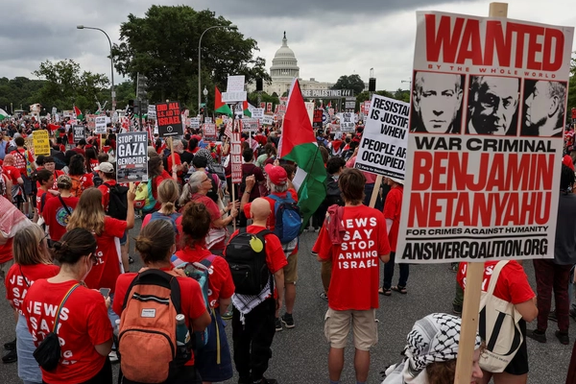
In unveiling his new strategy against Iran and Hamas, amid the ongoing Israeli-Palestinian conflict, Netanyahu said that Israel’s defeat of Hamas, would be a powerful blow to Iran’s axis of terror.
“Our fight is your fight. Our enemies are your enemies, and our victory will be your victory,” he said.
Referencing Iran's numerous proxies in the region, the Israeli leader framed the situation as a clash between "barbarism and civilization," emphasizing that "for the forces of civilization to triumph, America and Israel must stand together."
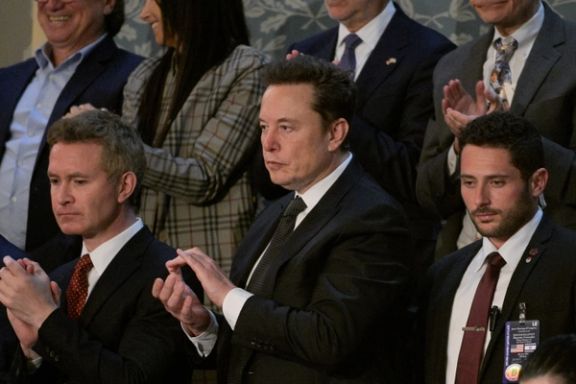
Netanyahu also took time to thank President Joe Biden for his response to Hamas’ October 7 attacks on Israel, expressing gratitude for his assistance with the hostages and ongoing support following the attack.
Before his arrival in the US, the Israeli Prime Minister expressed his hope that his meeting with Biden would strengthen the two nations' efforts against the "terrorist axis of Iran" and its proxies.
The leader’s visit this week, however, was largely overshadowed by the absence of both President Biden and Vice President Harris and protests around Capitol Hill.
Dozens of Democratic senators and representatives were absent, with some reportedly citing disagreement with Netanyahu’s policies, while others mentioned scheduling conflicts. Dozens of lawmakers had also skipped the Israeli leader’s speech in 2015.
The vice president usually presides over joint addresses, but Harris was in Indianapolis on her presidential campaign which she launched Sunday, after President Biden dropped his re-election bid.
Biden, meanwhile, is set to deliver his first address to the nation since announcing his decision not to seek re-election, with some arguing that it will further distract attentions from Netanyahu’s visit.
Both Biden and Harris are slated to meet with the Israeli Prime Minister separately on Thursday.
Biden and Harris were also visibly absent to greet the Israeli leader and his wife upon arrival.
But Harris’ plans, according to an aide who spoke with Politico, “should not be interpreted as a change in her position with regard to Israel.”
David Friedman, who served as the US ambassador to Israel during the Trump administration, was a vocal critic of Harris’ absence, stating that it is not just an insult to Netanyahu but also to Israel.
Her refusal to preside over the joint address “tells you everything you need to know about where she stands on Israel. All the far left Jewish groups trying to justify this incredible insult are convincing no one,” Friedman posted on X.
Former President Donald Trump is set to meet Netanyahu on Friday at Mar-a-Lago, his luxury resort in Palm Beach, Florida.
The stakes for the Israeli leader are high, as he faces mounting criticism and pressure to strike a cease-fire deal that would end the fighting in Gaza following the Israeli offensive that came after Hamas’ attacks on October 7, 2023. Palestinian health officials say tens of thousands have reportedly been killed since the war began.
Upon landing on Tuesday, Netanyahu and his wife Sara met with representatives of the families of the Israeli-American hostages held by Hamas. Reports suggest that the families had already been onboard the flight with the Prime Minister.
Shortly after the meeting, Netanyahu said that any cessation in military actions against Hamas could potentially compromise Israel's security in the face of threats from Iran.
“I am not prepared in any way to give in on the victory over Hamas. If we give up on this, we will be in danger in the face of Iran's entire axis of evil,” he said after the meeting.
Netanyahu said he is doing everything in his power to combine the necessary humanitarian objective and the imperative to return the hostages, and at the same time, “preserve the existence of the State of Israel.”
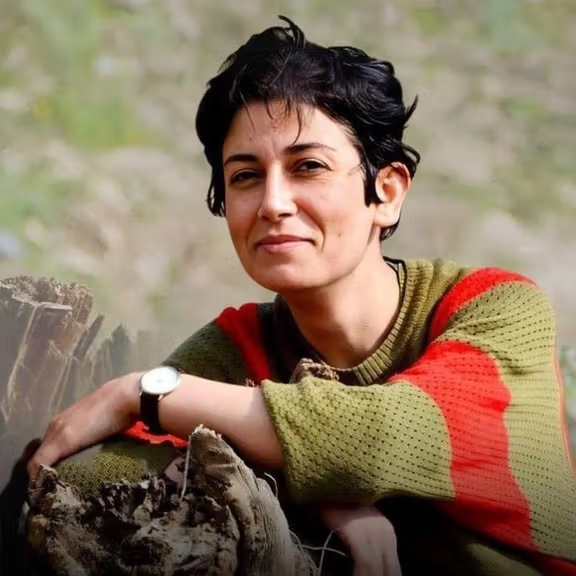
Iranian Kurdish political prisoner Pakhshan Azizi has been condemned to death on charges of armed rebellion, according to rights groups.
She is the second woman recently sentenced to death for "armed rebellion" just a month after labor activist Sharifeh Mohammadi faced similar allegations.
The Hengaw Human Rights Organization, a Kurdish advocacy group, also reported that Azizi had received a four-year prison term for membership in opposition groups. Her lawyers were notified of the sentence on Tuesday.
Azizi was arrested in Tehran last year and Hengaw reported that several of her family members were also detained but released after a few days.
The court issued the death sentence for Azizi while depriving her of access to legal counsel and family visits for several months, denying her fair and transparent legal proceedings, according to the rights group.
Hengaw recently published a letter from Azizi in which she recounted enduring repeated instances of torture and hanging during her detention. Furthermore, authorities have denied her the right to meet or contact her family for the past two weeks.
Previously, Azizi was arrested in 2009 during a protest by Kurdish students at Tehran University against the execution of political prisoners. After four months in detention, she was released on bail.
Human rights organizations have repeatedly condemned the severe torture inflicted on prisoners and the coerced confessions extracted from them.
The minority Kurds in Iran have faced extensive persecution since the establishment of the Islamic Republic. According to the rights group Hengaw, at least 266 prisoners were executed across Iran during the first half of 2024 as the country's execution spree continues. Among those executed were 72 Kurds.
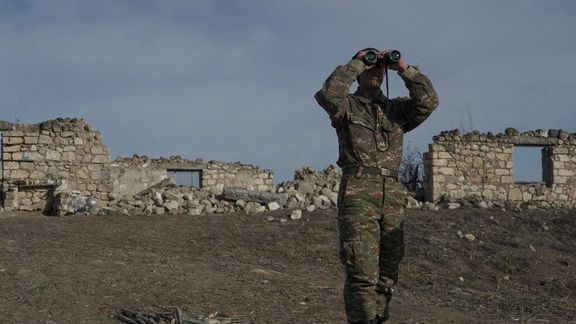
Iran and Armenia have signed a major arms deal worth $500 million, a source familiar with the situation told Iran International, in a move that could anger Azerbaijan as Tehran supplies Yerevan its infamous suicide drones.
Armenia and Azerbaijan have fought two major wars since the collapse of Soviet rule in the early 1990s, with Azerbaijan retaking large chunks of its territory in 2020. Its forces last year captured the region of Nagorno-Karabakh, the chief focus of the long-running conflict.
Iran has repeatedly warned that it will not tolerate any changes to international borders in the region.
The reported agreement has been broken up into several contracts and was signed in the past few months, according to the source, who is a senior military official in the Middle East. Iran International has not identified them for their protection.
Iran International has obtained an exclusive list of the military items Iran is set to supply Armenia. That includes drones such as Shahed 136, Shahed 129, Shahed 197, Mohajer, and air defense missile systems like 3rd Khordad, Majid, 15th Khordad, and Arman.
This deal has not been reported before. The foreign and defense ministries of Iran and Armenia did not respond to Iran International’s separate requests for comments.
Update: After the publication, Armenia's Ministry of Foreign Affairs did not deny the deal, in an official email response to Iran International. "Armenia is currently diversifying its security relations within the framework of international law. We don't have any further comment on this," said a spokesperson for the Ministry of Foreign Affairs of the Republic of Armenia.
Armenia's Foreign Affairs Ministry sent another email after that, referring Iran International to an article written in a local Armenian publication, where the country's Ministry of Defense dismissed our reporting as fictitious and false. Iran International reached out to Armenia's Defense Ministry and never received a response.
Farzin Nadimi, an arms expert from the Washington Institute, said a deal of this scale is substantial for the Caucasus nation.
“Iran has sold Armenia drones [before] for example, and some other arms, but nothing at this scale,” said Nadimi.
Armenia’s Ministry of Finance reported that defense spending in 2024 increased by 81% as compared to 2020. Armenia’s defense budget in 2024 was about $1.4 billion, so the amount being allocated to Iran through this deal is about a third of that budget. It is not known how Armenia can afford this, but some analysts believe loan payments could be an option.
The Iran-Armenia arms deal goes beyond supplying suicide drones and air defense missiles. It also involves intelligence cooperation, close military relations, training, and the establishment of bases on Armenian soil, the source has revealed to Iran International.
“I don’t think the region will be happy. I don’t think the United States will be happy,” said Nadimi.
The source said that security cooperation between the two countries, including advancing arms deals, had been discussed during the visits of high-level delegations and technical teams from Iran in recent months.
Iran-Armenia ties have not come without some controversy.
During an interview with Armenian radio on June 28, Mehdi Sobhani, the Ambassador of the Islamic Republic of Iran in Armenia sent a bold message to the United States, stating “my message is that they [Americans] should not interfere unnecessarily in the relations between Iran and Armenia.”
Safeguard from Azerbaijan: lessons learned from the war
Alex Vatanka, the Middle East Institute’s Iran Program director, said Armenians are looking elsewhere, to France, India, the US and Iran for their security needs.
“Armenia is not in a good place militarily. The last few years have not been good for them. They've lost in two major campaigns to their historic nemesis, Azerbaijan. And they have lost confidence in their historic protector Russia,” said Vatanka.
An arms deal between Iran and Armenia would help Tehran to remain relevant in the Caucasus, said Vatanka.

In 2020, after decades of intermittent skirmishes, Azerbaijan launched a 44-day military operation that became known as the ‘Second Karabakh War.’ Several thousand people were killed on both sides.
Military analysts attribute Azerbaijan’s victory, breaking through Armenian defenses, to drones acquired from Turkey and Israel.
From 2016 to 2020, Israel accounted for 69 percent of Azerbaijan’s imports of major arms, according to the Stockholm International Peace Research Institute.
Turkey made up 2.9 percent of Azerbaijan’s imports of major arms, including missiles and armed UAVs, from 2011-2020.
“Armenia wants to catch up on that front. If Iran can provide drones, why not?,” said Vatanka.
The arms deal between Iran and Armenia would go beyond the two nations and impact Iran-Azerbaijan relations especially after Iran elected an ethnic Turkish speaking as president.
“Azerbaijan will be very, very angry about his deal. But Iran wants to show its dissatisfaction with Azerbaijan, as well, because Azerbaijan is a major customer of Israeli weapons. Azerbaijan and Israel have had strategic relationships. I think Iran will use these deals to show Azerbaijan that its relations with Israel would further move Iran toward Armenia,” said Nadimi.
Armenian security analysts, who are in direct contact with the government, declined Iran International for an interview, citing that they don’t believe that a deal of such magnitude exists. Those experts said Armenia is moving closer to the West and wouldn’t risk its relations with the US, for example, over Iran and sanctions violations, believing that to do so would be a public relations disaster for the tiny nation. One Armenian analysts said he heard that Iran is pushing the deal, but that Armenia declined.
The experts were referring to the Armenian government's efforts to expand ties with the West since Russia became entangled in the Ukraine quagmire. Yerevan has forged military cooperation with France and the United States, including nine days of joint military drills with US forces in July.
The Russian Equation and the War in Ukraine?
Military expert Frederic Labarre from the Royal Military College of Canada said the massive deal could happen for several reasons. He said it signifies a ‘necessity’ for Armenia to defend itself against Azerbaijan, but it could also be a way for Russia to acquire arms through Armenia.
“It could be a way in which Armenia can still endear itself to Russia by being the go between Iran and Russia, especially in the provision of drones and, such equipment, in such a way that. It will be difficult for Western powers or other powers to pressure Armenia,” he said.
Labarre, who specializes in Russia and Ukraine defense and military, hypothesizes that Armenia may be transferring weapons on behalf of Russia.